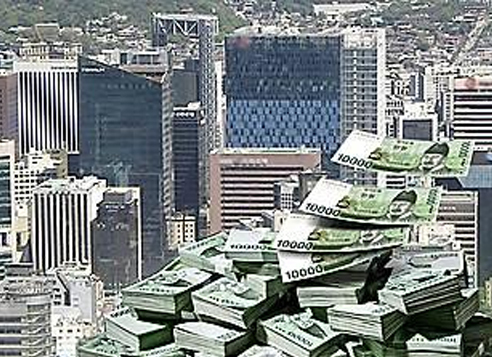The South Korean economy has been showing some modest signs of recovery thanks to brisk exports and investment but the momentum remains weak due to flaccid private consumption, a state-run think tank said Sunday.
"Exports and investment maintained high growth, signaling that economic activity has continued to expand at a moderate pace," the Korea Development Institute said in its monthly evaluation of the country's economic conditions. "Exports exhibited relatively high growth as semiconductors continued to do well and the delivery of vessels jumped temporarily."
 |
(Yonhap) |
Asia's fourth-largest economy saw its outbound shipments jump to a nearly seven-year high of 24.2 percent in April, extending their winning streak to six months.
The upswing was led by a 102 percent on-year surge in exports of ships and a 56.9 percent rise in overseas sales of semiconductors.
The KDI report said such improvement in exports is partially attributable to the recovery of the global economy, while the Seoul government revised up its exports growth forecast for 2017 to as high as 7 percent from its earlier plan of 2.9 percent.
Facility investment was also strong recently, largely led by the stellar sales of chips, as the equipment investment index rose 22.8 percent on-year in March.
March's all industry production grew 4 percent from a year earlier, with a 3-percent gain in the mining and manufacturing sector, down from a 6 percent rise in the previous month. The manufacturing capacity utilization rate edged up to 72.6 percent in March from 71 percent in February.
The upbeat pace in the production and exports sides was, however, offset by sluggish private consumption.
"Growth in retail sales and services production remained weak, while consumer sentiment exhibited a slight recovery," said the KDI report, adding "A robust recovery is not yet evident."
Retail sales climbed 1.6 percent in March, slightly up from 0.5 percent in the previous month, with the seasonally adjusted growth staying unchanged from a month earlier.
Wholesale and retail trade moved up 0.7 percent, while accommodation and food services retreated 3.6 percent to continue the downward slide since the second half of last year.
But the KDI said composite consumer sentiment index hit 101.2 in April, up from last month's 96.7, marking the highest reached since October last year when it stood at 102, on growing positive sentiments about economic conditions. (Yonhap)





![[Herald Interview] 'Korea, don't repeat Hong Kong's mistakes on foreign caregivers'](http://res.heraldm.com/phpwas/restmb_idxmake.php?idx=644&simg=/content/image/2024/11/13/20241113050481_0.jpg)
![[KH Explains] Why Yoon golfing is so controversial](http://res.heraldm.com/phpwas/restmb_idxmake.php?idx=644&simg=/content/image/2024/11/13/20241113050608_0.jpg)

